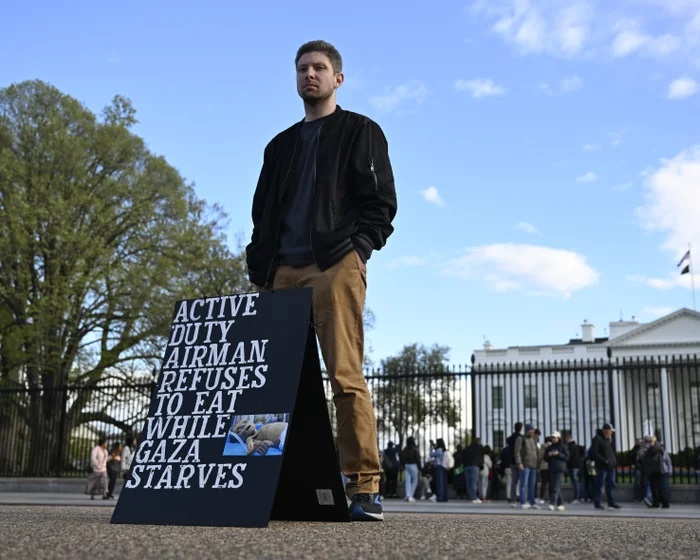A group of Maine residents have reportedly planned to launch a 40-day hunger strike starting Thursday, May 22, 2025 in support of Gaza.
These Mainers are joining a national movement protesting Israel’s blockade of Gaza and the rising levels of hunger in the region.
The action is part of a growing wave of protests across the United States aimed at drawing attention to the deepening humanitarian crisis in Gaza.
The Maine Coalition for Palestine announced that 25 individuals would participate in the hunger strike to highlight the severe conditions in Gaza.
Erin Kiley, one of the organizers and participants, stated in an email to The Guardian that the group has been taking action for the past 19 months to stop what she referred to as genocide.
She emphasized that they are now willing to endure starvation to push for justice, declaring, “There’s no business as usual during a holocaust of children.”
The coalition is demanding several changes, including the unrestricted delivery of humanitarian aid to Gaza and a complete halt to U.S. arms sales to Israel.
Kiley noted that if their demands are not met within 40 days, they plan to escalate their efforts, though the next steps have not been finalized.
Participants will approach the hunger strike in different ways.
Some plan to consume only 250 calories per day, aligning their intake with what they claim is the current caloric consumption level for 90% of Gazans under Israel’s military blockade.
Others intend to fast in a manner similar to Ramadan, abstaining from all food and drink from sunrise to sunset, for the full 40-day duration.
This initiative in Maine aligns with a broader national call to action by Veterans for Peace, a nonprofit organization that also began its own 40-day hunger strike on Thursday.
The group is urging the U.S. government to resume humanitarian aid to Gaza under United Nations supervision and to end military support to Israel.
Across the country, similar hunger strikes have been organized by students and activists, especially on college campuses.
These efforts are in direct response to Israel’s 11-week blockade of humanitarian supplies, such as food, water, and medical aid.
On the other hand, the Israeli military continues its bombardment of Gaza.
Although Israel has recently allowed limited aid deliveries following global criticism, humanitarian organizations insist that the assistance is nowhere near sufficient to meet the population’s urgent needs.
The national wave of hunger strikes first gained traction on university campuses, where students began refusing food to express solidarity with Gazans.
It was also with the aim to push for their schools to divest from companies they believe are complicit in the conflict.
Campus protests have generally been subdued due to administrative crackdowns and pressure from the Trump administration.
Although recent weeks have seen a resurgence in activism as commencement ceremonies approach and conditions in Gaza grow more dire.
At Yale University, several students have been on hunger strike since May 10.
In California, more than 30 students from institutions including Stanford University, California State University (CSU), and UCLA also began hunger strikes earlier this month.
They described their protest as an act of solidarity with the two million Palestinians facing starvation in Gaza.
At Stanford, approximately two dozen students were actively participating in the strike as of Monday.
Their demands include:
- university divestment from firms they say benefit from Israel’s blockade,
- the dismissal of charges against protesters from a prior demonstration, and,
- the removal of restrictions on free speech following an encampment.
The University of Oregon also saw a hunger strike begin on May 19, primarily led by Jewish Voice for Peace’s campus chapter.
Their demands include divestment, honoring a commitment to grant scholarships to five students from Gaza, and lifting protest limitations on campus.
At San Francisco State University, students ended their hunger strike on May 12 after the university agreed to enhance its divestment policy and pursue academic partnerships with Palestinian institutions.
The school previously committed to divesting from companies involved in weapons manufacturing, though it stated the policy is not specific to any region.
Students at CSU Long Beach recently concluded a 12-day hunger strike, stating they needed time to recover physically but would continue their advocacy.
At UCLA, hunger striker Maya Abdullah was hospitalized on her ninth day without food.
In a video posted to Instagram on May 20, she revealed she passed out on campus and was rushed to the hospital.
She criticized the UCLA administration for not responding to her medical emergency.
UCLA later issued a statement affirming its support for peaceful protest and free expression, encouraging students to remain safe and noting that health and counseling services remain available.







